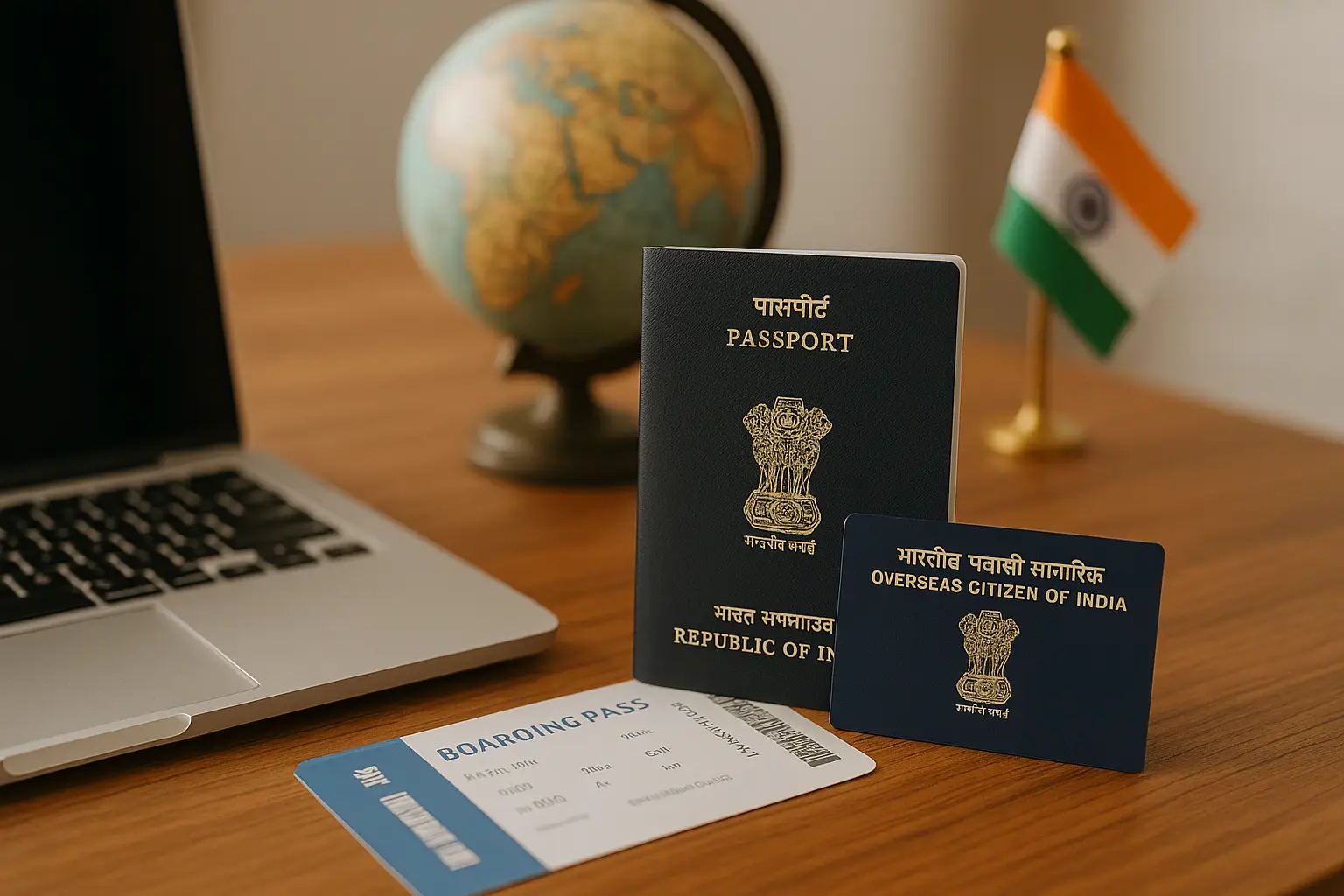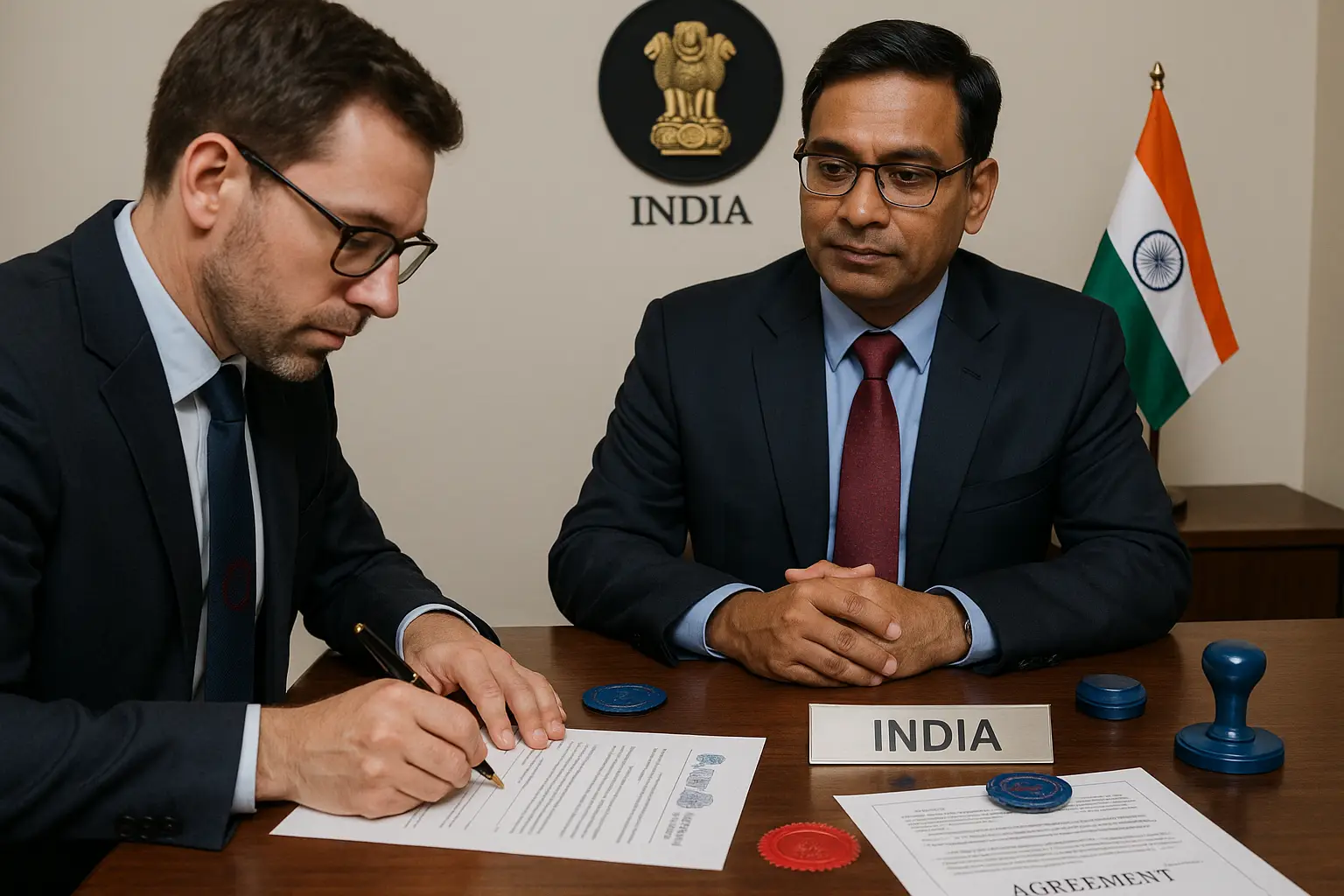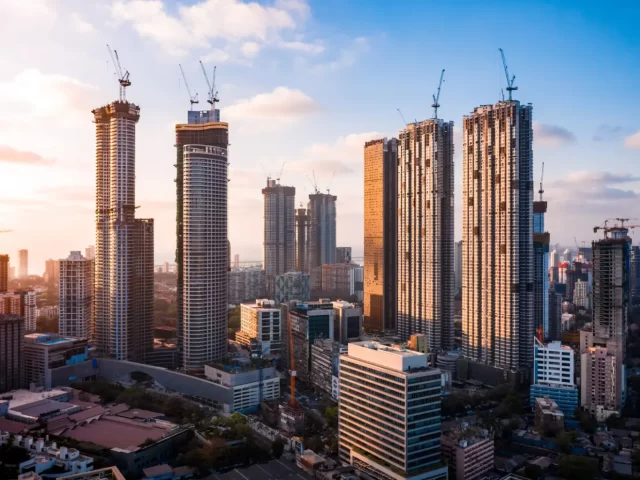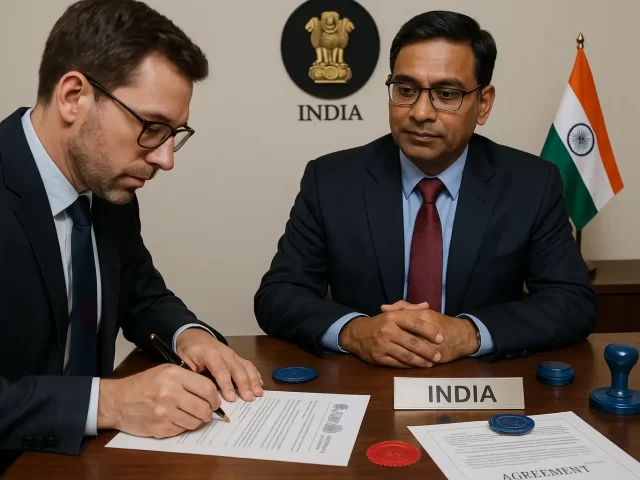Valid Indian Passport and/or OCI Card

The most fundamental requirement for any NRI investing in Indian real estate is having a valid identification that confirms their eligibility to buy property in India. An Indian passport is sufficient for those who still retain Indian citizenship. However, for those who have acquired foreign citizenship, an OCI (Overseas Citizen of India) card is mandatory.
The OCI card functions as a lifelong visa and grants most property rights that an Indian citizen enjoys. OCI holders can buy residential and commercial properties in India but are restricted from purchasing agricultural land, plantation property, or farmhouses. Ensuring these documents are current and valid is the first step toward initiating any legal property transaction.
Before engaging with sellers, brokers, or banks, NRIs must confirm that their passport has not expired and their OCI card details are properly updated. These identity documents will be required at multiple stages — from agreement signing to home loan application and registration of the property.
If either document is unavailable or expired, it is advisable to initiate the renewal or application process in advance to avoid delays.
PAN Card (Permanent Account Number)
A PAN card is a critical document for NRIs buying property in India, primarily due to tax compliance requirements. Issued by the Income Tax Department of India, it serves as a unique identifier for all financial transactions, including property purchases, capital gains, and income from rent.

Whether the NRI is buying a new flat, commercial property, or land, a PAN card is mandatory at the time of property registration. It is also required for the deduction and payment of TDS (Tax Deducted at Source), which is applicable when an NRI sells property in India.
Without a PAN card, NRIs will face difficulties in completing the sale deed, registering the property, or complying with post-purchase tax obligations. Many banks also require PAN details when approving home loans or opening NRE/NRO accounts used for property transactions.
NRIs who do not already have a PAN card can apply online via the NSDL or UTIITSL portals. The process is straightforward, and the card can be delivered internationally. It’s strongly recommended to apply well in advance of any transaction timeline.
Address Proof (India and Overseas)
For property transactions in India, NRIs are often required to provide both overseas and Indian address proofs. This dual verification helps banks, builders, and government authorities confirm the buyer’s identity and contactability across jurisdictions.
Accepted forms of overseas address proof include utility bills, bank account statements, lease agreements, or government-issued identity cards. These documents should clearly display the NRI’s full name and current foreign residential address.

If the NRI has an Indian address—either a family residence, rental property, or ancestral home—they may be asked to furnish proof for it as well. Valid documents include Aadhaar card, voter ID, electricity bill, or Indian bank account statement.
Address proofs are particularly important during the KYC (Know Your Customer) process for opening NRE/NRO bank accounts, applying for home loans, or completing registration formalities. Inaccurate or missing address information can lead to delays in verification and processing.
It’s important to ensure that all documents submitted are current, legible, and in English or translated into English with an attestation from a recognized authority.
Bank Account in India (Preferably NRE/NRO)
To facilitate seamless property transactions, NRIs must operate an Indian bank account—preferably a Non-Resident External (NRE) or Non-Resident Ordinary (NRO) account. These accounts are specifically designed for non-residents and are essential for routing payments related to property purchases, home loans, maintenance charges, or repatriation of rental income.
An NRE account is ideal for holding income earned abroad and is fully repatriable—both principal and interest. It also offers tax-free interest earnings in India. On the other hand, an NRO account is suited for income earned within India, such as rent from the purchased property. While the principal in an NRO account is non-repatriable beyond a limit, interest earnings are subject to Indian taxation.
Both accounts can be opened jointly with another NRI or a resident Indian, depending on the bank’s terms. Leading Indian banks like SBI, ICICI, HDFC, and Axis offer online account opening services with video KYC for NRIs.
Having a functional NRE or NRO account not only simplifies financial transactions but also ensures compliance with RBI regulations. It is advisable to open the account well in advance of initiating the property buying process.
Key Points:
-
NRE account: Best for foreign income, fully repatriable, tax-free interest
-
NRO account: Suitable for Indian income, partially repatriable, taxable interest
-
Required for purchase payments, home loan EMI, and rental deposits
-
Open with Indian banks that support international KYC and NRI services
Sale Agreement and Title Deed Review

Once the NRI finalizes a property, reviewing the sale agreement and verifying the title deed becomes a critical legal step. These documents form the legal foundation of property ownership and must be thoroughly examined before any money is transferred.
The sale agreement outlines the terms and conditions agreed upon by the buyer and the seller. It includes details such as the property’s total cost, payment schedule, delivery timeline, possession date, and penalties for default. This agreement should be signed on stamp paper and registered if advance payment is involved.
The title deed confirms the seller’s legal ownership of the property. NRIs must ensure that the title is clear, marketable, and free of any legal disputes, mortgages, or pending loans. If the title is defective, the entire transaction can be deemed invalid, and the buyer may lose both money and possession.
It is highly recommended that NRIs engage a qualified real estate lawyer to:
-
Conduct a title search through the sub-registrar’s office
-
Check for encumbrances or charges on the property
-
Verify the property’s ownership history for at least the past 15 years
Proper due diligence at this stage helps avoid legal complications, financial loss, or prolonged litigation after the purchase is complete.
Tax Returns (Optional but Preferred)
While not legally mandatory for NRIs to file tax returns in India before buying property, doing so is considered a smart and proactive move—especially for those planning large transactions, taking loans, or earning rental income from Indian assets.
Filing Indian Income Tax Returns (ITRs) demonstrates financial transparency and credibility. It becomes particularly useful when:
-
Applying for a home loan from an Indian bank
-
Purchasing high-value properties that attract tax scrutiny
-
Claiming tax deductions on home loan interest or principal under Sections 24 and 80C
-
Planning to sell the property in the future and manage capital gains tax efficiently
Even if the NRI has no income in India, filing a “nil return” builds a tax record, which can be helpful for future transactions, creditworthiness, or compliance audits. If rental income or capital gains arise later, this return history helps avoid notices from the Income Tax Department.
Hiring a tax consultant or CA with NRI experience can help structure your filings accurately, especially with dual taxation treaties in mind.
Encumbrance Certificate (EC)
An Encumbrance Certificate is a vital legal document that confirms whether the property is free from any monetary or legal liabilities. It serves as proof that the property in question does not have any outstanding loans, legal disputes, or mortgages registered against it.
This certificate is issued by the sub-registrar’s office and contains a detailed record of all registered transactions related to the property over a specified period—usually 15 to 30 years. It helps ensure that the title is clear and the seller has the right to transfer ownership.
For NRIs, obtaining an EC is especially important when:
-
Buying a resale property
-
Purchasing land from a private seller
-
Verifying the ownership history before signing the sale deed
It is advisable to request a Form 15 EC (shows transactions) rather than Form 16 (no transactions recorded), as the former gives a detailed history. Most states now offer EC application and downloads through online property portals.
Failing to verify this document can expose NRIs to legal complications or loss of investment due to hidden liabilities on the property. A real estate lawyer or property consultant can help access and interpret the EC before proceeding with the purchase.
Allotment Letter or Builder Agreement (for New Projects)
For NRIs purchasing under-construction or newly launched properties directly from a builder, the allotment letter and builder-buyer agreement are two of the most important documents. These documents formally establish your legal right to the specific unit and lock in the agreed pricing and terms.

The allotment letter is issued by the developer once the initial booking amount is paid. It includes:
-
Unit number and layout details
-
Total cost and breakdown
-
Payment milestones
-
Project completion timelines
-
Developer’s RERA registration details
The builder-buyer agreement, which follows the allotment letter, is a legally binding contract and must be registered. It outlines terms related to possession, construction quality, cancellation policies, and penalties for delay.
Failing to collect these documents can cause problems in loan approvals, resale, or legal disputes later. Always ensure the builder is registered with the state RERA authority and that the project has valid approvals.
| Document Type | New Project (Builder) | Resale Property |
|---|---|---|
| Allotment Letter | Mandatory after booking | Not applicable |
| Builder-Buyer Agreement | Required; must be registered | Not applicable |
| Title Deed | Provided at possession | Must be verified before purchase |
| EC & Past Transactions | Builder provides clean title proof | Must be obtained from sub-registrar |
| Payment Schedule | Defined in the builder agreement | Mutually decided with seller |
Home Loan Sanction Documents (If Applicable)
If an NRI plans to finance the property through an Indian bank or housing finance company, specific documents must be submitted for loan sanction and disbursal. These documents help lenders evaluate the borrower’s creditworthiness, income stability, and legal eligibility under RBI’s NRI lending guidelines.
Most Indian banks have dedicated NRI home loan products with relaxed documentation if the applicant has a valid NRE/NRO account and income proof from a reputed foreign employer. However, the documentation process must still be followed thoroughly.
Typical documents required for NRI home loan approval include:
-
Copy of valid passport and visa
-
OCI card (if applicable)
-
Employment contract or offer letter from foreign employer
-
Salary slips for the last 3 to 6 months
-
Overseas bank account statements (salary credit proof)
-
Indian NRE/NRO account details
-
Power of Attorney (if the applicant is abroad during disbursal)
-
Property documents such as sale agreement or builder-buyer agreement
Each lender may have slight variations in their documentation checklist, but most follow similar KYC and verification standards. NRIs are also subject to a higher margin requirement, meaning a minimum 20–25% down payment is usually needed.
Getting pre-approval before selecting the property helps streamline negotiations and speeds up the registration process once the deal is finalized.
Property Registration Documents (At Time of Purchase)
After all approvals, payments, and agreements are complete, the final and legally binding step in the property buying process is registration. This process officially records the change in ownership and ensures the property is legally transferred to the buyer’s name under the Indian Registration Act.
At the time of registration, the NRI buyer (or their authorized representative holding Power of Attorney) must be present at the sub-registrar’s office. The following documents are generated or submitted during this stage:
-
Sale Deed: The core legal document that transfers ownership from seller to buyer. It must be printed on stamp paper, signed by both parties, and registered.
-
Stamp Duty Receipt: Proof that the required stamp duty has been paid. The amount varies by state and is usually a percentage of the transaction value.
-
Registration Certificate: Official proof that the sale deed has been recorded in the government registry.
-
Mutation Documents: Used to update the municipal or land revenue records with the new owner’s name, essential for paying property taxes in the future.
It is advisable to have a legal professional or property consultant assist in verifying stamp duty calculations and ensure that all original documents are collected and stored securely after registration.
Final Thoughts
Buying property in India as an NRI is a rewarding investment, but it requires careful attention to legal and financial documentation. Each stage of the process—from initial identity verification to final registration—depends on having the right papers in order. Whether you’re purchasing a new flat from a builder or a resale unit from an individual, the clarity and completeness of your documents will determine the smoothness of the transaction.
Start by ensuring your passport or OCI card is valid, get a PAN card, and open an NRE or NRO account well in advance. Appoint a trusted Power of Attorney if you’re not available in India, and always consult a real estate lawyer to help with title verification and legal vetting.
Documentation may feel overwhelming at first, but approaching it methodically—with expert help where needed—can protect your investment and ensure long-term peace of mind. With proper due diligence and the documents outlined in this guide, NRIs can confidently navigate the Indian real estate market and secure a valuable asset back home.
NRI Tax & Repatriation Checklist:
- Use NRE/NRO accounts for buying & receiving rent
- Declare Indian income in your ITR (India)
- Claim DTAA benefits in your resident country ITR
- Retain proof of tax paid (TDS certificate/Form 26AS)
- Consult a CA for repatriation certificate (15CB) before funds transfer





















